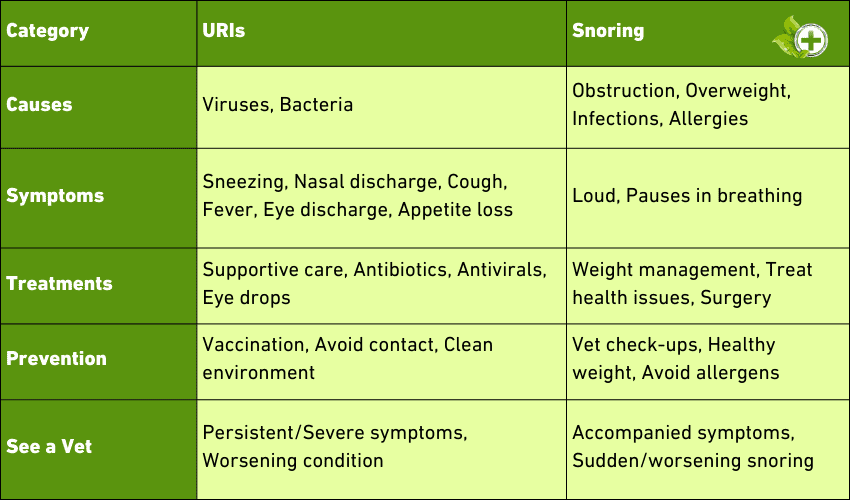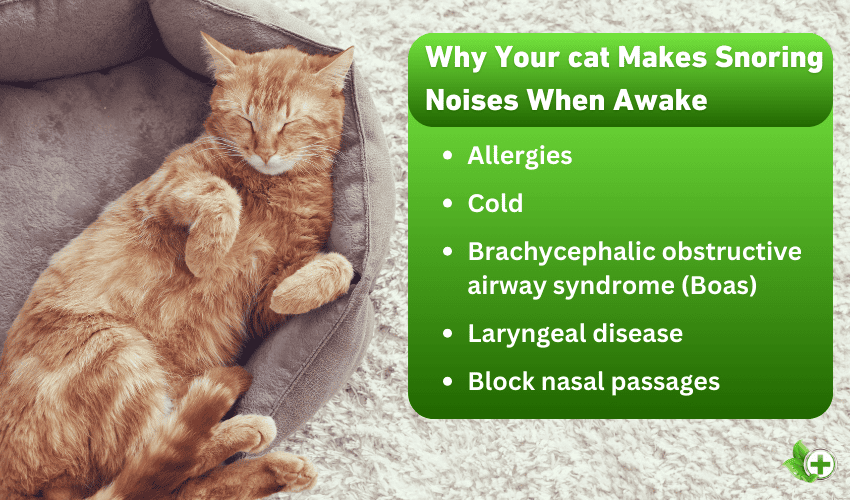Quick Reference
Why Is My Cat Snoring?
- Cat Is In A Deep Sleep
- Breed Specific Facial Shape
- Obesity
- Nasopharyngeal Polyps
- Diabetes
- Age
- Physical Deformities
- Brachycephalic Obstructive Airway Syndrome (Boas)
- Feline Asthma
- Laryngeal Disease
- Other Upper Respiratory Infections
Why Does My Cat Make Snoring Noises When Awake?
- Allergies
- Cold
- Brachycephalic Obstructive Airway Syndrome (Boas)
- Laryngeal Disease
- Other Respiratory Issues
How Can I Prevent My Cat From Snoring?
- Elevate your cat's head when they sleep by placing a pillow or towel under their head.
- Try to keep your cat's head and neck aligned when they sleep.
- Do not let your cat sleep on their back, as this can worsen snoring.
- If your cat sleeps in a crate or carrier, ensure they have enough room to move around and change positions.


- HomeoPet Feline Nose Relief Natural Pet Medicine, Nasal and Sinus-Tract Support for Cats of All Ages, 15 Milliliters

- VETRISCIENCE Vetri Lysine Plus DMG Immune Support Treats for Cats and Kittens, 120 Bite Sized Chews

- Pet Naturals Lysine for Cats, Chicken Flavor, 60 Chews - Immune and Respiratory Support for Cats - No Wheat or Corn - Vet Recommended
Listen To Our Quick Audio
Many cat owners are aware of purring, but most do not know that cats also snore. Like some humans, cats can also be noisy sleepers. But, this behavior is often unnoticed because they are not as loud as dogs. In fact, many people are surprised to learn their cats snore when they hear it for the first time.
Is cat snoring normal, and what can we do about it? Let's learn more about the sleep behavior of cats, the reasons for cat snoring, and whether we can do anything to stop it.
Normal sleep behavior of cats
Cats are mesmerizing creatures when it comes to sleep. They generally sleep for 16 hours daily, broken up into three 75-minute sessions. During each session, they experience REM sleep like humans do.
While cats are generally unresponsive and their eyes don't move during non-REM sleep, they sometimes move around in their dreams. This includes moving their eyes, tails, limbs, and diaphragms. Their eyes may open and close, making jerky movements with their limbs.
Cat snoring is common in both REM sleep and non-REM sleep. While it can be common, it can sometimes also be cause for concern. If you wondered why cats sleep so much, we previously wrote about this subject in the article 6 Reasons Why Cats Sleep So Much.
Why is my cat snoring? Causes of cat snore
Our deep research about a cat's sleep behavior shows that there can be many reasons why your cat is snoring. Some of these are harmless and nothing to worry about, while others may need medical attention.
The most common cause of cat snoring is due to their anatomy. Cats have long noses and thin sinus passages. This combination can result in snoring, especially when they are lying on their backs. Other causes of cat snoring can include:

Cat is in a deep sleep
Cats snore when they are deeply asleep. This is because their body relaxes completely, and the soft tissues around the passageways of the nose and throat relax as well. This causes the loose flap of skin at the back of the nasal passage to vibrate and produce a snoring sound

Breed specific facial shape
Certain cat breeds, like Persians, are more prone to snoring because of their short noses and flat faces. The shortened distance between the nostrils and the soft palate results in a greater chance of snoring.
Obesity
Obese cats are more likely to snore. This is because they have more fatty tissue around their necks, which can obstruct their airways and cause snoring. Obesity is common in cat breeds like Persians and Maine Coons.
One way to avoid obesity is to make your cat more active by providing scratching pads or posts. For this, we recommend buying a Splarwbk 1 Cat Ball Launcher and a Saolife Automatic Cat Laser Toy.
Nasopharyngeal polyps
Nasopharyngeal polyps are non-malignant, inflammatory growths that develop in the middle ear or eustachian tube and migrate into the pharynx. These polyps can obstruct the airway and cause snoring in cats.[1]

Diabetes
Feline Diabetes is a less common cause of snoring in cats. When a cat has diabetes, their bodies cannot process glucose properly. This can lead to hypersomatotropism, where the body produces excess growth hormones.
These growth hormones can cause an increase in fat deposits, which can lead to snoring. According to a study about Cat Diabetes published at NLH, about 24% of Diabate cats can have hypersomatotropism (HS). [2]
Age
Cats are more prone to snore as they age. This is because their muscles and tissues weaken with age, and they are more likely to develop obesity.

Physical deformities
Some cats may have physical deformities that make them more prone to snoring. For example, a deviated septum (a condition where the bone and cartilage that divide the nostrils are off-center) can cause cat snoring. Studies show that deviated septum is common in cats, with 27.7% deviated frontal sinus septum. [3]
Brachycephalic obstructive airway syndrome (Boas)
A fairly common condition in cats, Brachycephalic Obstructive Airway Syndrome causes the soft tissues in the throat and nose to collapse and obstruct the airway. This can result in snoring, difficulty breathing, and other respiratory problems.[4]
The facial conformation of cats, such as shorter muzzles, significantly affect respiratory difficulties and abnormal breathing sounds in Brachycephalic cats. The report further suggests that the authorities should change the breed standards of certain feline breeds to improve their health and welfare.
Feline asthma
Cat snoring is common in feline asthma, which can be fatal. Feline asthma is a chronic airway inflammation that can cause difficulty breathing, wheezing, and coughing. In severe cases, it can cause the airways to collapse and result in death.[5]
Feline asthma is uncommon, affecting about 1% to 5% of the feline population. But, its a potentially fatal condition, and cats with feline asthma should see a veterinarian immediately.
Laryngeal disease
The laryngeal disease is any condition affecting the larynx or voice box. It is a common cause of snoring in cats. Other symptoms of Laryngeal disease include wheezing, panting, vomiting or retching, lack of voice, coughing, and difficulty breathing.
The laryngeal disease is commonly caused by viral infections, allergies, or tumors. Laryngeal neoplasia has a poor prognosis regardless of treatment, though uncommon. [6]
Other upper respiratory infections
Besides the above disorders, some other respiratory issues result in cat snores and other signs and symptoms. They are;
- trauma
- foreign bodies
- infectious agents (bacterial infections, fungal infections)
- tooth root infections or other oral diseases
- nasopharyngeal stenosis
- chronic rhinosinusitis
Some of these health conditions can result in life-threatening conditions like feline Asthma and Laryngeal disease. If you suspect your cat has an upper respiratory infection, you should contact your vet immediately. [7] Wondering if your cat’s breed is a factor in their snoring? Discover unique traits and behaviors of the Siamese Ragdoll cat in our comprehensive guide, Your Ultimate In-Depth Guide To The Siamese Ragdoll Cat.

Why does my cat make snoring noises when awake?
Usually, snoring occurs when cats sleep, but some cats may make snoring noises when they are awake. This could be due to various reasons, including:
Allergies
As mentioned earlier, allergies are one of the most common causes of snoring in cats. If your cat is allergic to something in the environment, such as pollen, dust, or grass, the airways might get inflamed, causing them to snore even when they are awake.
Cold
A cold can also cause your cat to snore. This is because a cold can cause the airways to become inflamed and produce mucus, which can block the airways and cause snoring.
Brachycephalic obstructive airway syndrome (Boas)
As mentioned earlier, Boas can result in snoring, difficulty breathing, and other respiratory problems. If your cat is particularly a brachycephalic breed like a Persian, you may hear snoring sounds even when they are awake.
Laryngeal disease
Laryngeal Disease can trigger snoring and also audible breathing in cats. Since this is a fatal medical problem, you should take your cat to the vet as soon as possible if you think they may have Laryngeal Disease.
Other respiratory issues
Other respiratory issues can also block nasal passages resulting in snoring in cats when they are awake. This is medically called stridor. If your cat has difficulty breathing, you should immediately take them to a licensed veterinarian.

How can I prevent my cat from snoring?
Some sleeping positions can trigger or worsen snoring. So, if your cat snores, you should try to change its sleeping position. Since cats do not appreciate disturbing their sleep, you may have to experiment a little to find the perfect position for your cat. Some tips that may help are;
- Elevate your cat's head when they sleep by placing a pillow or towel under their head.
- Try to keep your cat's head and neck aligned when they sleep.
- Do not let your cat sleep on their back, as this can worsen snoring.
- If your cat sleeps in a crate or carrier, ensure they have enough room to move around and change positions.
- If your cat is overweight, you could try to lose weight to reduce or eliminate snoring.
- If your cat suffers from allergies, try to identify and remove the allergen from the environment. You may also have to give your cat allergy medication prescribed by a veterinarian.
- If your cat has a cold or any other respiratory disease, you should take them to the vet for treatment.
While there is no sure-fire way to prevent your cat from snoring, these tips may only help reduce or eliminate snoring.
Note: Wondering if your cat’s snoring is a sign of a health issue that could affect their ability as a service animal? Explore our blog on cats as service animals, where we delve into the qualifications, training, and health requirements that ensure they are at their best
Conclusion
As you can see, a cat's snoring alone is not a cause for concern, but if you observe any other signs and symptoms of diseases in your cat, you should take them to the vet for a check-up. If your sleeping cat is snoring, chances are that your cat is just having a relaxed sleep. So, don't panic. Observe your feline friend carefully and take action if something is off in your cat.
FAQ
What Should I Do If My Cat Snores?
If your cat's snore is aloud or new, consult a veterinarian for a check-up. If your cat has been snoring for a while and you don't observe any other symptoms, then there's no need to worry. Just let your cat enjoy a good sleep.
What Medicine Can I Give My Cat For A Cold?
If your cat has a cold, we suggest taking your cat to the vet for a check-up and treatment. You should not give over-the-counter medication intended for humans to cats.
References
- Pubmed: Nasopharyngeal polyps in cats
- NLH: Studying Cat (Felis catus) Diabetes: Beware of the Acromegalic Imposter
- Pubmed: Computed tomographic evaluation of anatomic and pathologic variations
- Pubmed: Flat Feline Faces
- NLH: Feline Asthma
- NLH: Laryngeal Disease in Dogs and Cats
- NLH: Respiratory and Thoracic Medicine
⚠️Disclaimer: The information provided on this pet care blog is for informational purposes only and is not intended as a substitute for professional veterinary advice, diagnosis, or treatment. Always seek the advice of your veterinarian or other qualified pet health provider with any questions you may have regarding the care of your chinchilla or any other pet.

